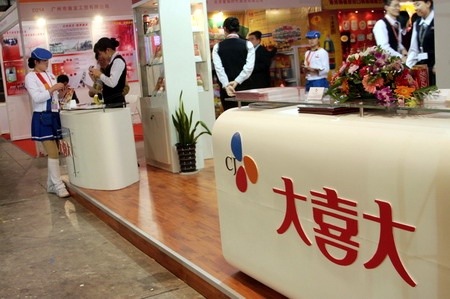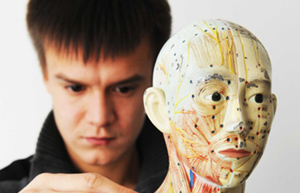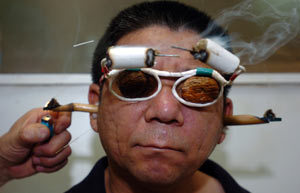CJ Cheiljedang aims for more growth
Updated: 2010-11-22 13:20
By Mao Lijun (China Daily)
A Chinese character logo for Daxida chicken essence at a CJ CheilJedang booth during a trade fair in Beijing. The South Korean retailer, distributor and maker of processed foods has been expanding since entering China in 1995. [Photo / China Daily]

South Korean food conglomerate has diverse China expansion plans
BEIJING - CJ Cheiljedang, the South Korean retailer, distributor and maker of processed foods, which recently moved into the entertainment industry with the creation of CJ Entertainment and built the largest multiplex movie theater franchise in its homeland, is aiming to expand its business further in China.
Since entering China in Qingdao in 1995, the corporation has been expanding steadily and successfully growing all its four core businesses of food and food service, bio-pharmaceuticals, entertainment and media, and home shopping and logistics.
"No company can define itself as a life and culture company in China except us," said Park Keun-Tae, president and chief executive officer of CJ China.
"We've been steadily growing in China for the past 15 years and we will continue to expand our investment in the country in the future."
In 1995, the company chose Qingdao, a coastal city in Shandong province, as the location for its first food processing company in China.
The plant produced Daxida chicken essence and Daxida seasoning and curry, which quickly won over Chinese consumers.
However, CJ's development in China has not all been smooth going.
In the middle of the 1990s, CJ built flour making and meat processing factories in China, but the businesses failed and CJ had to relinquish the facilities. A noodle restaurant chain also failed after four years.
But CJ says it has learned lessons and begun to pay greater attention to localization.
In 2006, CJ adjusted its strategy for exploring the Chinese market by teaming up with local companies.
In March 2007, CJ established a joint venture with Beijing Ershang Group, the largest food company in Beijing, and began a tofu business in China.
The cooperation boosted CJ, which began to place its logo on Baiwi tofu, Ershang Group's tofu brand.
Due to the power of the Baiwi brand, which is one of the 400 national brands authorized by the Chinese government, and CJ's refrigerated logistics system, CJ was selected to supply tofu to the Olympic Village during the 2008 Beijing Olympic Games.
With marketing experience in the tofu market of Beijing, CJ successfully expanded the business to other large Chinese cities.
In August 2008, CJ set up another joint venture with Beidahuang Group, Asia's largest grain producer.
A total of $31 million was invested in the Harbin-based venture, which is 49 percent owned by the CJ group.
The joint venture can produce 14,000 tons of products a year, including brown rice protein and brown rice oil, from grain produced in northeast China's Heilongjiang province, the company said.
CJ's Home shopping business joint ventures with Shanghai Media Group (SMG) and Tianjin TV also saw great success.
SMG-CJ has become the largest TV home shopping company in China, providing services to more than 10 million households mainly in the Shanghai area. In 2007 its market share was estimated at 1.6 billion yuan ($234 million).
So far, CJ has established 30 corporations in 19 provinces, autonomous regions and municipalities and offices in Beijing, Shanghai, Guangzhou, Chengdu and other major cities. It has gradually built up a network that includes Hong Kong and Taiwan with its four core businesses.
"As the center of our global business, we hope sales in China can account for half of our overseas sales in the future." said Park.
"To carry out our programs and expand our businesses, we will invest 10 billion yuan in the Chinese market and hope to realize sales of 35 billion yuan in 2013 which is CJ's 60th anniversary," said Park.
The company is expected to have 7.2 billion yuan in sales in China this year.
| ||||
"We hope our business in China can grow to be bigger than anywhere outside South Korea," Park said.
In the latest signal of its business growth in the Chinese market, the company opened a new multiplex cinema in September near the Bird's Nest, the main stadium of the 2008 Beijing Olympic Games.
The eight-screen complex is fully digital and 3-D capable. It has standard and VIP theaters and what it calls a 4-D Plex that features vibrating seats, water and wind effects.
The latest opening takes the number of CJ's operational parks to five, including cinemas in Shanghai, Wuhan and Tianjin. It has five other multiplexes at different stages of construction.
"We will expand to other Chinese cities to have more than 30 multiplexes within five years," said Kim Joo-Hyung, chief executive officer of CJ CGV, which is an affiliate of CJ Entertainment.
CJ is also partnering with IMAX, the Canadian operator of large-screen movie theaters, to install 15 new theaters in China by 2015. The addition will result in 96 IMAX theaters being set up in the country with CJ as the operator.
"We believe China will be the No 1 growth market for CJ," Park said.
CJ Cheiljedang was launched as a sugar company in Seoul in 1953. It was originally part of Samsung Group, now South Korea's largest conglomerate. Cheiljedang blossomed and, in 1996, it separated from the parent group completely and renamed itself CJ, short for Cheiljedang.
Although it started out with a modest 2.2 trillion won ($1.96 billion) in sales in its first year after parting from Samsung, the CJ Group now stands as one of South Korea's top private conglomerates with estimated sales last year of around $12.5 billion.
At present, it has 63 South Korean subsidiaries under its wings, most of them focused on food, biotechnology, shopping and the entertainment industry.
Paper's Digest

China bags Asiad team tennis title after 24 yrs
Wimbledon semifinalist Li Na led host China to capture the team tennis title on Tuesday at the Asian Games, accomplishing her Asiad tour with three consecutive victories.
China rate rises no panacea to curb inflation: PBOC adviser
Specials

Russian possessed with TCM
Born into a family of doctors, Maxime became interested in Traditional Chinese Medicine (TCM) at the age of 12, after hearing about TCM theories such as health preservation and recuperation.

Acupuncture takes stab at UNESCO list
Acupuncture and Peking Opera have been selected as candidates for UNESCO intangible cultural heritage status.

The wedding coach comes back to life
A groom carries his bride from a wedding coach in Xuchang, Henan province, Nov 11, 2010. Produced a local factory, various original hand-made wedding carriages were displayed on the streets, attracting young people chasing fashion and an environment-friendly lifestyle.




